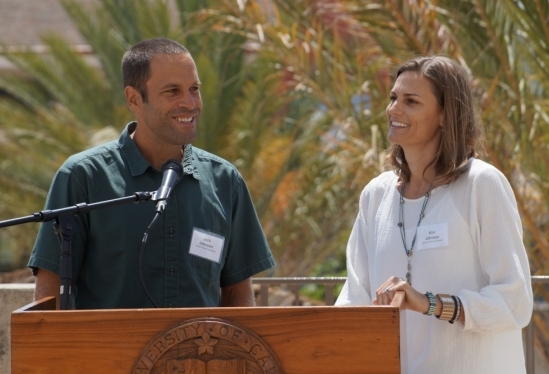News
Farm Team
April 29, 2015Alumni Jack and Kim Johnson team with UCSB’s Associated Students Food Bank and Department of Public Worms on new Edible Campus project to grow food on campus

With a nod to their alma mater as the place where their relationship began — and where their shared passion for food first sprouted — UC Santa Barbara alumni Jack and Kim Johnson haved helped plant the first seeds in a fledging initiative with the ultimate goal of an on-campus farm run by students for students.
The Edible Campus project, a collaboration of the couple’s Johnson Ohana Foundation, UCSB Associated Students’ Food Bank and Department of Public Worms (DPW) and UCSB Sustainability, launched with the ceremonial planting of two navel orange trees at Storke Plaza. All the fruit that is eventually produced will go to the Food Bank for distribution to its student clientele.
“Our learning and our love story began here on campus — and also our attraction to food and the impacts of it,” Jack Johnson said. “This symbolic action is the beginning to what is hopefully a longer conversation we can be having about food here on campus and how our foundation can be involved in it. Our passion is introducing young kids to where their food comes from. If we plant that seed now, as they get older they’ll be able to tackle the bigger questions. And that’s what you guys are doing. We’re so proud, being UCSB alumni, to see what you guys are doing.”
“It’s great for us to come back to UCSB, see these amazing things happening and realize it’s exactly what we’ve been supporting elsewhere,” agreed Kim Johnson. “ Our base message is: eating close to the source. When you’re talking about nutrition, you eat close to the source and you’ll always eat most nutritious food. If you think about it in terms of food security, the environmental footprint of food and food miles, eating close to the source is also important. We’re all on the same page here.”
The idea to grow food on campus, for campus, has been in the Department of Public Worms’ sites for several years. Turning food waste into fresh food through composting, the group’s core activity, also presented the opportunity to create and model a so-called “closed loop” system in the UCSB student community. Factor in the rapidly growing numbers of students tapping the AS Food Bank for supplemental sustenance and the need became even clearer.
Simultaneously — and serendipitously — the Johnsons, whose foundation has a focus on environmental education and food, came calling with an interest in funding just such a project. So began the new initiative, which is starting with citrus trees but could ultimately grow into a comprehensive food production program and student farm.
“Food is being thrown away on a daily basis, while there are many students at UCSB who struggle to access nutritious food,” said Jessica Foster, a fourth-year environmental studies major and student coordinator of DPW. “The Edible Campus Project dovetails with DPW’s current efforts to use food waste to grow food in our educational garden, which has been used as a space to teach students and community members about growing their own food. This new collaboration with the AS Food Bank provides us the exciting opportunity to supply fresh produce grown by students for students in need of fresh, nutritious food.”
Fundraising is already underway to expand the program with additional trees as plans are developed for other edible campus efforts.
“In dialogue with the Johnsons, we developed the citrus trees program as a first step,” said Katie Maynard, a campus sustainability coordinator based in UCSB’s Department of Geography. “Our hope is to eventually be able to provide a wide variety of fresh food to students, as well as create an educational space to learn about what goes into the practice of small-scale food production and the important role it plays in our goal to eliminate food insecurity.”
The latter component is an especially key concern for the food bank, which has serviced close to 3,000 students since summer 2014 alone. Alarming statistics about the growing number of students skipping meals for financial reasons — often prioritizing tuition payments and other costs over eating — underscore the reality of food insecurity on campus and the imperative of addressing it, according to Katie Freeze, who chairs the Food Bank Committee.
“Everybody has the right to sustainable, organic food that’s good for their bodies — it shouldn’t be some upper-class thing,” said Freeze, a fourth-year environmental studies major. “Healthy food is one of the most basic human rights there is. And the biggest demand from our clients is for better nutrition.
“We’re a holistic service at the Food Bank,” she added. “We’re trying to do more than just hand our clients calories — we’re trying to provide nutrition, we’re trying to provide knowledge. And we’re hoping that when they are able to directly access where their food is coming from, they’ll have more knowledge going forward to make healthier decisions for themselves. That’s the opportunity we have with the Edible Campus project, and we’re super excited to see it take off.”
- Read the write up here: http://www.news.ucsb.edu/2015/015356/farm-team#sthash.37nPzdR9.dpuf